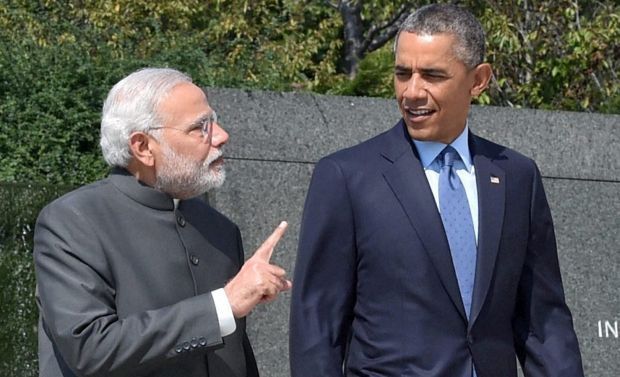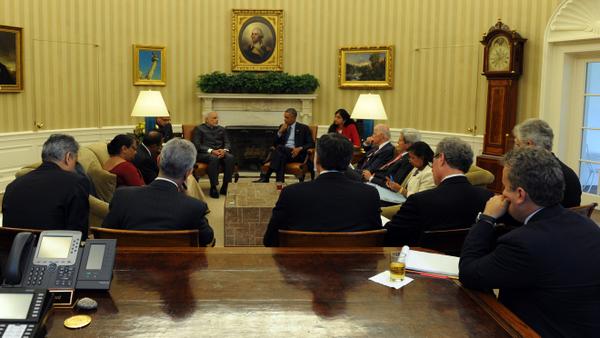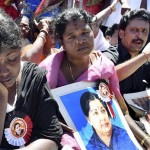
Washington: At a joint media appearance with Obama, Modi expressed the hope that India-US relations will make fast progress. “Both of us are committed taking forward the civil nuclear partnership agreement. We are serious about resolving at the earliest issues relating to civil nuclear energy cooperation. This is important for India for meeting energy security needs,” he said.
The Indo-US nuclear deal concluded between the previous Manmohan Singh government and the Bush Administration has been stalled because of issues relating to libality laws. At the same time, Modi said that he had requested Obama to “take such steps which would ensure easier access to Indian companies in the service sector in the US market”.
In the defence sector, the prime minister said both the sides decided to take forward the dialogue in security and defence. He invited the US defence companies to participate in Indian defence manufacturing sector to help in its development. India has recently raised the foreign investment cap in the defence sector from 26 to 49 per cent. Sharing concerns over the threat of terrorism in South Asia and emerging challenges in West Asia, where Islamist group ISIS has been on the rampage, Modi said the two countries agreed to intensify cooperation in counter terrorism and intelligence sharing. Obama said India was emerging as a major power for peace and security in the region. Both of them had a candid discussion about WTO issues.

“India supports trade facilitation but it is my wish that a solution should take care of our food security concerns. I am sure that it is possible to do that early.” “I am looking forward to building up on relationship and make more progress,” he said. The President said the two leaders discussed various issues including trade and economic cooperation, cooperate in exploration of space and scientific developments especially to deal with challenges like Ebola.
After the meeting between Modi and Obama, officials made it clear that India was not going to join “any coalition” in fight against terrorism in West Asia.
Likewise, they clarified that a trilateral partnership agreed on Afghanistan, would be developmental in nature and not military cooperation. They also said that the “joint and concerted efforts” on dismantling safe havens for terrorist groups and criminal networks do not mean that India and the US were not going to launch operations but carry out any UN-mandated task.
Modi and Obama, whose discussions covered a broad range of issues including cooperation in defence, security, energy economic and space, took a significant decision to break the impasse on implementation of civil nuclear deal. “We are serious about resolving issues on both sides in civil nuclear energy cooperation. This is important to India for meeting energy security needs,” Modi said.
An inter-agency contact group will be set up to address the issues of liability, administrative and technical issues. From the Indian side, agencies like DAE, MEA and Finance Ministry will be involved. “We are setting up an inter-agency contact group to be able to resolve all issues that are outstanding and hindering the rapid deployment of US-origin nuclear reactors in India, that includes by liability, it includes administrative issues and it includes technical issues,” Vikram Doraiswami, Joint Secretary (Americas), in the MEA, told reporters while briefing on the meeting between Modi and Obama. Doraiswamy said while India was not going to join any coalition against terrorism, the two sides had agreed on the need to deal with “travellers of terrorism” – radicalised people who travel for participating in terror activities in West Asia.
“This is a very major issue for us,” he said. On Afghanistan, Modi and Obama discussed the political, security and economic transition which is underway. “We
continue to be very supportive of the transition process in Afghanistan,” the Indian official said. Holding that India and the US are natural global partners, the two countries extended defence cooperation for another 10 years. Modi invited US companies to participate in defence manufacturing sector in India, which has recently raised the FDI cap from 26 to 49 per cent.
Expanding on the strategic partnership, Obama said India meets the standards of the Missile Technology Control Regime (MTCR) and is “now ready” for the membership of the elite Nuclear Suppliers Group (NSG), a 48-member body which controls global nuclear trade. Obama also reaffirmed US support for India’s membership of the expanded UN Security Council and backed it for “voice and vote” in international financial institutions like IMF and World Bank.


